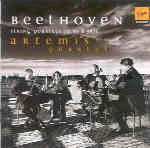With this release the Artemis Quartet launches a Beethoven Quartet cycle for Virgin Classics, entering a crowded field of world-class contenders that includes the ensemble’s earlier Op. 18 No. 2/Op. 131 and Op. 59 No. 3/Op. 132 couplings on Ars Musici. The players throw themselves into the “Serioso” quartet’s opening line of fire with the same vehement drive that the Emerson and Juilliard quartets display, sometimes leaving abrasive skid marks in their wake. At the same time, their tightly sprung rhythms in the third movement retain more tonal sheen, although I prefer how the Vegh Quartet’s slightly slower tempo gives Beethoven’s polyphony more character and room to breathe. The Artemis’ blended sonority in the finale’s opening section somewhat neutralizes the music’s mystery, but at least Beethoven’s Larghetto is taken at face value rather than being milked to Adagio proportions. The rambunctious coda is as ebullient and virtuosic as we could wish.
From an executional standpoint, the F major “Razumovsky” quartet is nothing if not state-of-the-art. Notice, for example, the Artemis’ absolute unanimity with regard to dynamic gradations, attacks and releases of chords, and balances within chords, especially in the first-movement development section and in the Allegretto Vivace. Yet for all the beauty of the Artemis Quartet’s carefully calibrated slow movement, the Alban Berg’s warmer timbre and vibrant inner voices convey a more grounded, emotionally compelling experience. Roseline Kassap-Riefenstahl’s booklet notes succinctly describe what the music sounds like, and the engineering is ideal.
































